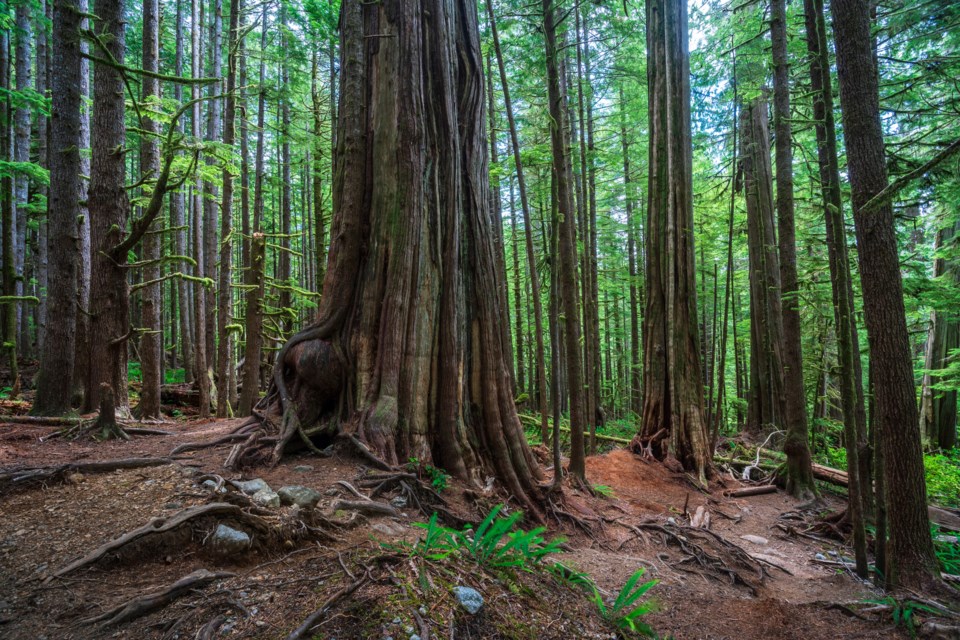A new conservation foundation is working to provide Indigenous and other land-based communities with funds to protect endangered ecosystems and build economic alternatives to the logging of at-risk old-growth forests.
It’s unjust and impractical to expect communities that rely on revenue from activities such as forestry, ranching or resource extraction to bear the financial burden of shifting their local economy on their own to protect areas for the benefit of all, said Ken Wu, chair of the recently established Nature-Based Solutions Foundation (NBSF).
Case in point is the current old-growth deferral process underway in B.C., where the provincial government has asked First Nations to consider putting logging on hold in at-risk old-growth forests but hasn’t offered any compensation to do so, said Wu, also executive director of the Endangered Ecosystems Alliance.
“It’s both unrealistic and unreasonable to expect First Nations to just walk away from their main revenue sources in order to save old-growth,” Wu said.
“For there to be environmental, economic and social justice, there needs to be a sustainable economic alternative with key financing.”
Conservation financing allows communities to protect or conserve valuable ecosystems and is ideally paired with the development of economic alternatives in areas such as tourism, recreation, clean energy, sustainable fisheries and agriculture, or the setting up Indigenous Guardian programs, where people who live on the land become the stewards of conservation areas in their territories, Wu said.
Conservation foundations like the NBSF and private funding sources can help plug some gaps in conservation financing, but provincial and federal governments need to step up and provide the lion’s share, he added.
The Great Bear Rainforest — a conservation area the size of Ireland on the central coast of B.C. — is a good case study in conservation financing that resulted in Indigenous-led environmental stewardship and sustainable development and forest protections, Wu said.
A total of $60 million from conservation groups was matched with $30 million each from the provincial and federal governments resulting in a landmark agreement in 2016, which has created more than 1,000 jobs, 100 businesses, and numerous Guardian Watchmen programs by the First Nations involved.
“Any time First Nations have had equivalent economic alternatives to keep old-growth forest standing and build an alternative economy, they’ve chosen the protection path,” Wu said.
The federal government put $50 million on the table to protect old-growth forests in B.C. and allocated a landmark $340 million to support Indigenous leadership in nature conservation and stewardship last year, Wu noted.
But B.C., which has jurisdiction over forestry in the province, appears to have done little to take advantage of that funding or co-operate with Ottawa to compensate First Nations considering logging deferrals, Wu said.
And the province certainly hasn’t offered any funding to offset any anticipated loss of forestry revenue, he added.
“Those potential deferrals form the core of future protected areas,” Wu said.
“If you lose those deferral areas, you lose the heart of the old-growth in conserved areas.”
Despite being a relatively new foundation, NBSF has raised a little more than $1 million of the $50 million it hopes to reach in the next six months to help some First Nations interested in protecting old-growth logging offset revenue losses from deferrals, he said.
The foundation is involved in preliminary conversations with a handful of First Nations leaders, Wu said, adding he expects more interest in nature-based solutions to address climate change, the biodiversity crisis and to spur sustainable development.
“For now, we're just moving ahead quietly and seeing who's interested,” Wu said.
“And we'll keep moving forward.”
Rochelle Baker / Local Journalism Initiative / Canada’s National Observer




